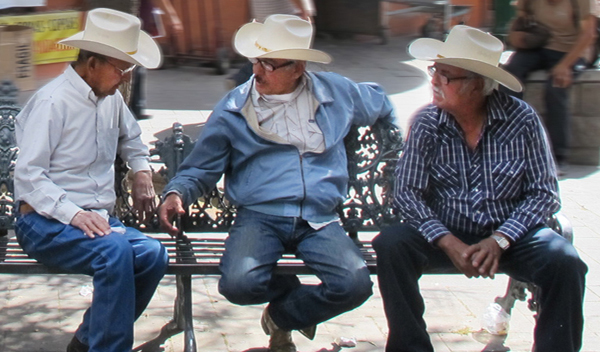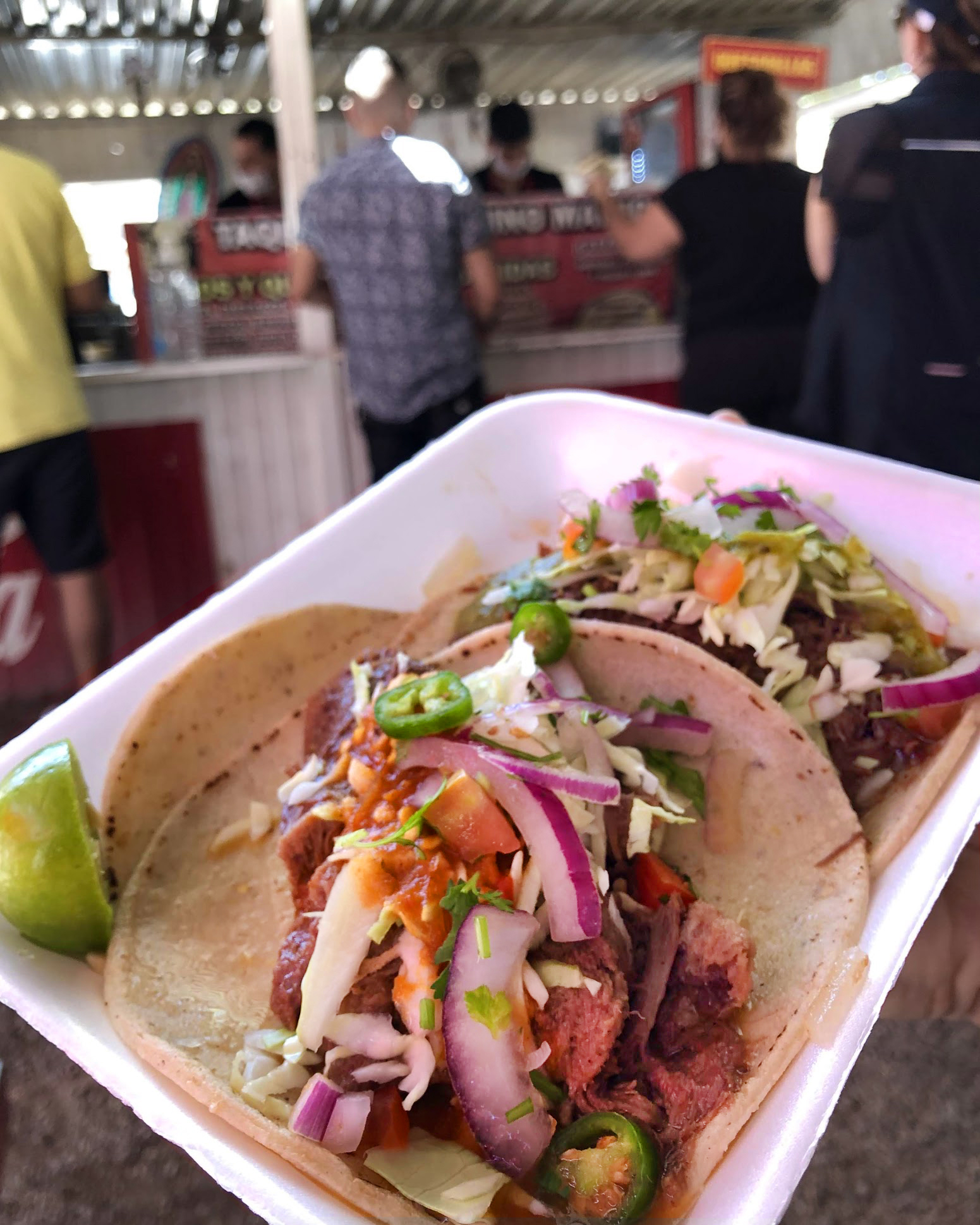Surf And Turf in Hermosillo, Sonora
It’s 2 p.m. on a sunny, cool, spring day in Hermosillo, Mexico. I stroll through the meat aisle of the century-old market surrounded by flaming crimson cuts of raw beef. I exit to a shady plaza behind the building. Groups of old-timers sporting Stetsons and pointed cowboy boots wile away the sultry afternoon. Shoeshiners polish, shoppers amble. Indigenous ladies in pleated skirts sell carved wooden animals. Lilting, accordion-heavy Norteña music emanates from shop radios. The mood is placid, amiable. Hermosillo, the capital of Sonora, is quiet, untouched by border violence. The town center conserves its frontier Old West ambiance. Sonora, in northwest Mexico, borders the U.S. states of Arizona and New Mexico, and the Mexican states of Chihuahua, Sinaloa and Baja California. It’s home to mountains, coastline and desert, people of Spanish heritage as well as the once-nomadic indigenous Seri tribe. Cattle ranching is one of the main industries, and beef raised here is considered the best in the country.
A steak dinner Sonora style at Palominos
The gastronomy of Hermosillo is unique to Mexico: It is in the middle of the desert but only an hour from the coast, an unusual geographic setting reflected in the food. Meat dishes, principally beef, are consumed in great quantity, but so is seafood. My mission is to investigate the regional cuisine, both high and “low.”
So I start with what everybody in the country knows Sonora for: steak. At Sonora Grill, aged rib eye is the best cut; a whole side is wheeled out and sliced to customer specification, then grilled over hot stones. Grain-fed beef is locally raised, certified Angus and dry aged for 25 to 30 days. The meat is juicy, just tender enough, with a lingering beefy-fatty taste — umami as it should be. I spend an afternoon sampling great local beef and drinking good wines from Baja California and even one from nearby Coahuila at Palominos a local favorite and a step up in sophistication from Sonora Grill. Best is the recently inaugurated Netto Cocina Sonorense. The smartly designed Netto is, perhaps a pioneer in the inevitable movement to update the traditional steakhouse.
Tacos at El Chino
Taco and Burros
José Luís is a swarthy mustachioed taxi driver of about 30. Sporting a wide-brimmed hat, white button-down shirt, black jeans and boots, he looks as if he’d just stepped off the set of “Gunsmoke.” Norteña plays as I get in his taxi — in Mexico it’s considered de riguer for guys to sit up front with the driver — it’s more macho that way. I open the conversation with the topic of food, a subject that needs no warmup small talk. Wasting no time, we speak of beef. José Luís explains that locals know their meat.
Although the breeds are the same as those raised up north, principally Angus, ranches are smaller; cows are grazed outside the pen longer and fed less grain. So they taste better. “We know when beef has been imported from the United States,” he chuckles, puffing on a Marlboro. “A place here was selling imported meat recently — we know just looking at it — they were shut down and the guy practically run out of town on a rail!” Where did he like to eat beef? “Oh, my mother makes the best; I never eat out,” he replies.
Carnes Aldecoa
Carnes Aldecoa
I enjoy a good steak, and Sonora, Palominos and Netto don’t fail to please, but my ravenous meat cravings aren’t totally satisfied until I find the amazing Carnes Aldecoa. This on-the-road butcher shop both sells and cooks. Buy the meat you want, any kind and quantity. I choose a cut called diezmillo, which is recommended over the much more expensive rib eye. The butcher weighs, you pay, then they grill it for you over mesquite coals in huge outdoor grills. Served chopped as tacos, this is a divinely carnivorous experience. Freshly made tortillas are sold separately out back. While most customers take the grilled meat home, I eat au plein aire at the picnic tables provided.
Head Tacos at El Chino
Tacos El Chino Mario is a beloved institution in Hermosillo; Taqueria el Chino Mario. It’s an open-air taqueria with metal tables situated under the shade of a large ficus tree.
El Chino watches over his grill
Mario Valenzuela Vera, the eponymous “chino” (he used to have curly hair, a ‘chino’ in Mexico) opens the taqueria daily at 6 a.m. and closes it at when the main ingredient, carne de cabeza, (head of the cow) runs out. Head tacos, better than they sound, are wrapped in lovingly hand-formed tortillas and doused with a variety of rich, brick-red salsas are a perfect crudo-breaker. I went for an order of cachete, the tender cheek so prized on the Iberian peninsula but sadly under-used in the Americas. Lengua – tongue – is as tender as a baby’s behind. I sampled a ‘taco de ojo’ – the literal version of the Mexican reference to a passing pretty girl – I’d rather look at the girl, as I can’t say I fancy my food staring quizzically back at me; the eye has a gelatinous quality that is a bit off-putting.
a burro at Los Longos
Taquería Los Longos: Burritos the Sonora way
It is 3 p.m., and I have been eating nonstop since sunrise. But Paco, another taxista, portly and gregarious, insists on taking me to Taquería los Longos, where a regional version of burritos is proffered. These burros (really, the diminutive “ito” is all wrong) are in fact spectacularly huge, thin handmade wheat tortillas filled with up to 3 guisados — rich, earthy chili and beef-based stews. Unlike the northern burrito bombs, no rice, beans or kitchen sinks are thrown in. Paco joins me in a burro, teaching me how to tear off bits of tortilla to scoop up mouthfuls of picante sauce, then when down to the nub, fold it into a wrap, not unlike the experience of downing a dosa in south India.
KeBurros is a local chain whose fare is closer to that of north-of-the-border but manages to stay true to norteño flavors.
And Surf: El Pescadito
Moving on to oceanic offerings, I go in search of the best seafood. Semi-outdoor fish taco stands and small restaurants abound. El Pescadito, on a corner in a quiet working-class residential neighborhood is bustling at 8:30 in the morning. Apparently locals don’t see anything strange about having fish tacos for breakfast. Pescado estilo baja is cazón, a small shark, chunks of which are battered, deep-fried and served in a light wheat tortilla with fresh pico de gallo and optional salsas to spike things up. This gold standard of fish tacos is steaming, crunchy, fishy — but not too — and augmented but not overwhelmed by its accompaniments. It’s indeed a winner.
Caguamanta at Taquería Sonora
Cahuamanta - fish soup for breakfast
An outstanding local dish, often sold at tacos joints or by itself from pushcarts is cahuamanta, a hearty soup of manta raya (skate), shrimp and chopped carrots and potatoes, eaten as broth or strained and served in wheat tortillas as tacos. I had passed Omar’s stand on my way in from the airport and I just had to make my way back. At 1 in the afternoon Omar is cleaning up but still has some steaming cahuamanta for us – my taxi driver and me. We eat this Mexicanized bouillabaisse out of its Styrofoam cup accompanied by tortilla chips and the sound of zooming traffic. I can practically hear the ocean’s roar even though it is nowhere near. I am soon to discover that cahuamanta is commonly eaten for breakfast – the only morning seafood dish I’ve found in Mexico. Stands and locales are found all over town: more than 20 appear in a Google search. I enjoy a bowl at Los Efectivos overflowing with juicy pink shrimp, as well as at Taqueria Sonora, the favorite of local chef Ricardo Franco.
Oysters Rockefeller at La Barcaza
La Barcaza is a modest but tastefully designed space, refreshingly unpretentious, that strives to present sophisticated seafood fare. Oysters are shipped from the coast and presented either raw or prepared; the classic Rockefellers are textbook perfect, just as John D. would have liked them.
I end the day at the urbane cervezería owned by Buqui Bichi, Hermosillo’s only craft beer producer. At least six beers can be sampled here; I particularly like the bitter/sweet Kölsch style, and the rich, dark coffee stout. Chef Ricardo Franco’s aguachile de papada – tender pork jowl marinated in a lightly tart and spiky salsa with chiltepin, a regional chile – is the perfect accompaniment.
Hermosillo may seem provincial at first glance but its culinary heritage shows no signs of being subsumed into the morass of global or even national food. That’s a good thing.
Buqui Bichi Tap Room














